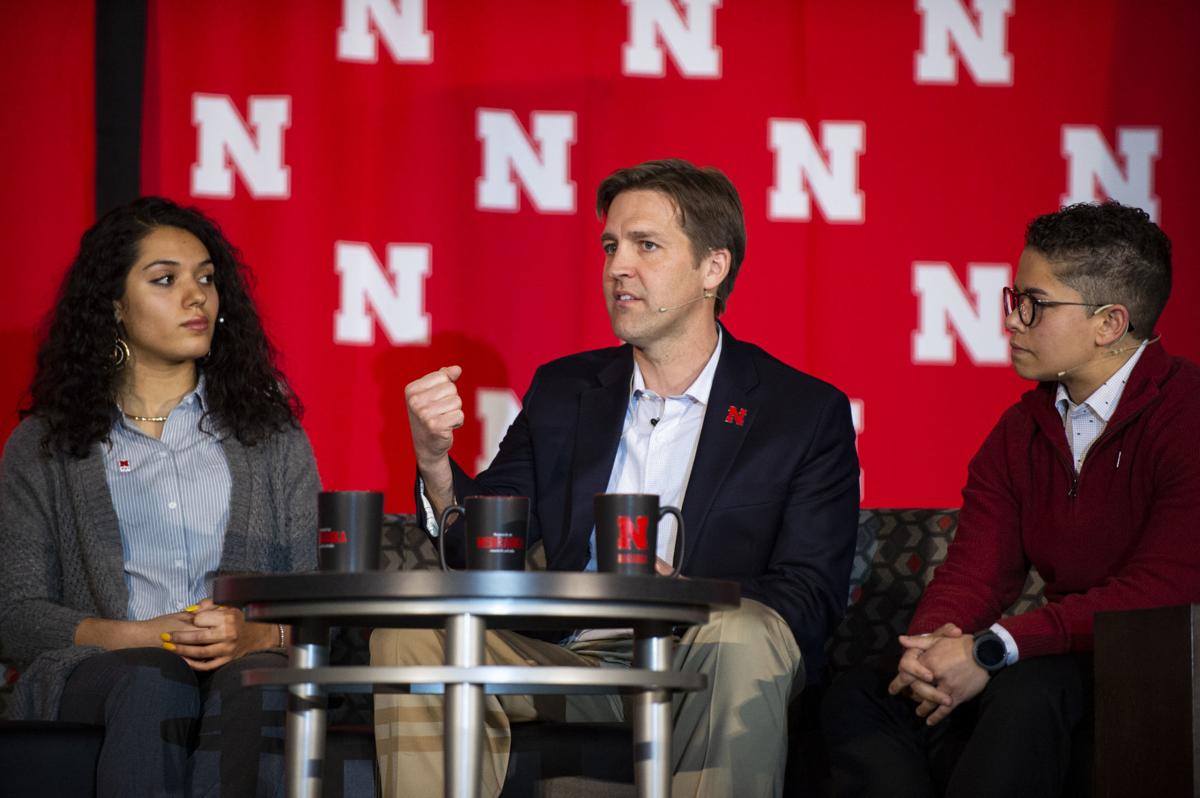
Similar to the Industrial Revolution more than a century ago, a digital revolution has changed the way Americans live, work and play, Sen. Ben Sasse told 600-plus students, faculty and community members at the University of Nebraska-Lincoln on Monday.
Technology has helped make Americans the richest people at any time in history and put the world at their fingertips, but it has also driven ongoing economic upheaval and led many to become disconnected from traditional community structures, Sasse said.
Kicking off UNL’s Charter Week celebration in a student-led conversation titled “Why Don’t We Get Along? How Huskers Can Change the Future,” Sasse said family, sense of location and long-term work framed the identities of Americans for generations.
“I think what’s happening now is people are hollowing out traditional tribes, tribes of place, and we’re trying to replace that with tribes of ideology,” he said, adding that the tribes Americans often pick — Republicans or Democrats — are not adequate replacements for communities.
“Right now, I think political tribes are rushing to fill a vacuum that’s created by the speed with which technology is undermining traditional tribes of rootedness,” he said at the NU Coliseum.
Sasse said UNL — and other universities across the country — will be called upon to lead the counter-revolution to the ongoing digital renaissance, preparing students for an ever-shifting economy, and teaching them to engage in meaningful ways away from screens.
Universities will need to think about instilling “grit and nimbleness” in students to prepare them for jobs that may not exist yet, as well as how to adapt quickly in a constantly changing world.
While Sasse suggested part of the solution included having students unplug — putting down their smartphones and closing their laptops — to have more face-to-face interactions around them in order to restore civil discourse, UNL student-panelists said the answer was more complex.
Growing technology use has exacerbated some rifts in American society, said senior political science major Hunter Traynor, but it has created opportunities for conversations to solve those problems elsewhere.
Traynor said Sasse’s argument for students to move away from technology in order to seek more conversations ignored their reality of growing up immersed in social media and other platforms that previous generations did not.
“It’s hard to think aspirationally when all the solutions are pitched in nostalgia,” said the Association of Students of the University of Nebraska president.
One experiment ASUN plans to roll out later this year, Traynor explained, is called “Converge Nebraska,” which will ask students to answer questions about issues and will pair them with someone with an opposing view.
“It will let them go off, find time to talk, and hash out their differences,” he said, with the goal of creating dialogues and more engagement on campus.
Grace Chambers, a junior sociology major, said UNL should build upon existing programs such as Husker Dialogues to foster more conversations on campus.
“I really think that at an institutional level, we have to practice what we preach and we have to actually be the place that we say we are as a university,” she said.
But, she added, technology and social media platforms such as Facebook and Twitter need to be used as tools to better educate and engage with a broad spectrum of students, rather than avoid using those methods at all.
Building on her point, Sasse said it’s important to think about “to what end” those tools are being used. In the past, the country’s brightest minds were tasked with how to keep gamblers in casinos, or how to get more people to use tobacco.
Now, those minds are trying to figure out how to keep people on their devices for as long as possible, he added.
Sasse said he’s not pitching an exclusive anti-technology argument. He said he appreciates how technology allows him to remain connected to friends and family regardless of geography, but he asked students to evaluate whether they were using it to supplement their relationships or substitute them.
Kamryn Sannicks, a junior political science major, said those meaningful relationships to build a community can begin with something as simple as greeting someone on campus.
More details at: https://soc.unl.edu/sasse-challenges-students-engage-meaningful-ways-%E2%80%94-away-screens